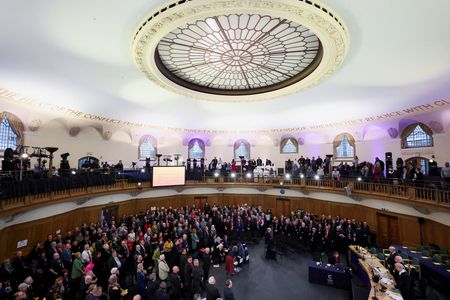By Suban Abdulla
LONDON (Reuters) -British wages grew by more than expected, according to data published on Tuesday, but other figures suggested the labour market is losing some of its inflationary heat, keeping the Bank of England on alert about when to cut interest rates.
Regular wages, excluding bonuses, grew by 6.0% in the first three months of 2024 compared with the same period a year earlier, the Office for National Statistics said.
Economists polled by Reuters had forecast wage growth of 5.9% which would have been lower than the 6.0% increase in the three months to February.
Rob Wood, chief UK economist at Pantheon Macroeconomics, said Tuesday’s data showed signs of a steady loosening in the labour market and the BoE would not be alarmed by wage growth figures which were in line with its latest forecasts.
“Much as we have concerns over the jobs data, the labour market keeps gradually easing, and they give the Monetary Policy Committee a hook to hang a June rate cut on,” Woods said.
Other analysts suggested that BoE policymakers might want to wait longer before cutting rates.
“Wage growth came in hotter than expected even as other indicators pointed to further clear weakening in the labour market,” Jack Kennedy, senior economist at jobs platform Indeed, said.
“That casts doubt on a June interest rate cut and will support the case for policymakers waiting for more evidence.”
RATE CUT DEBATE
The BoE last week signalled that it could start cutting rates from their current 16-year high of 5.25% as early as June.
Tuesday’s figures were the first of two official labour market data releases that the BoE will consider before its next meeting and its June 20 monetary policy announcement.
Finance minister Jeremy Hunt, who is trying to help Prime Minister Rishi Sunak rein in the big opinion poll lead of the opposition Labour Party before an election this year, pointed to how wages were outstripping inflation.
“This is the 10th month in a row that wages have risen faster than inflation which will help with the cost of living pressures on families,” Hunt said in a statement.
Total pay, which includes more volatile bonus payments, rose by 5.7%, above economists’ expectations of a 5.5% increase.
Private sector regular pay – a key metric for the BoE – eased slightly to 5.9% from 6.0% in the three months to February.
Sterling briefly edged up against the U.S. dollar after the figures were published. Investors kept their bets on future BoE rate cuts largely unchanged with the chance of first reduction in June priced at almost exactly 50-50.
Despite the stubbornly strong pay growth, there were signs that Britain’s labour market was cooling.
The ONS said the unemployment rate rose to 4.3%, its highest since the three months to July 2023, although it cautioned that the survey from which the jobless rate is calculated is still being overhauled.
Vacancies fell for the 22nd time in a row in the three months to April, dropping by 26,000 from the November-to-January period.
(Reporting by Suban Abdulla; Editing by William Schomberg, Kate Holton and Christina Fincher)












